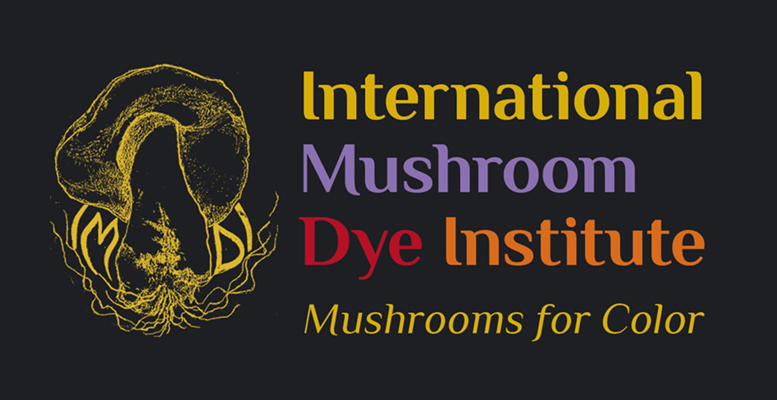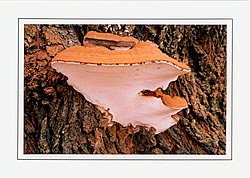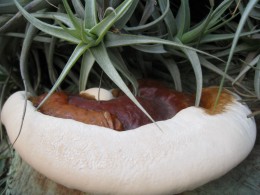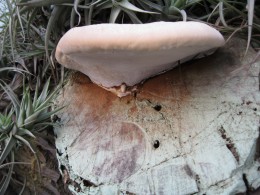International Fungi & Fibre Newsletter 2019
SPAIN Gran Canaria, the Spanish Contingent
Last year’s mushroom season in Gran Canaria was especially abundant in Gymnopilus penetrans and G. spectabilis as well as the always generous Pisolitus tinctoreus. We put up a demonstration on Fungi dye during the local mycological fair held by the Sociedad Micológica de Gran Canaria where we showed off what we learned and did in Norway. We are still working on the book on Nilia Bañares’s experience dyeing with mushrooms that will hopefully be finished by next year. We would like to make a call out to any natural dyers in Spain working with fungi. Our email is tintesconhongosES@gmail.com

Newsletter#2 from Spain 2012 ~ by Nilia Bañares & Maria Noelle
We are keeping busy,preparing the Symposium. We want to try to dye with vegetable linen & cotton fibes. It takes some time to prepare/mordant the fiber, but we are getting good colours, of course not so strong as with wool or silk, but it is a challenge. This year was very poor as we have not had enough rain or humidity but we hope next October will be a good one. I have participated last November with the Mycologist Society of Gran Canaria, we dedicate a week every year to the Mushrooms World, I participated with my samples of dyes from Fungi.
We are very busy organising the Symposium and we are receiving many calls so we hope for the best of it.
With best regards, Nilia
List #1 from North of Spain by Marie Noelle and Anna
“not all of them give strong colours but we have used them”
Amanita caesarea – amarillo
Amanita muscaria – ( solo la cutícula) amarillo-anaranjado
Auricula Judea – amarillo-beige
Boletus erythropus – amarillo muy flojo
Calvatia gigantea – verdes claros
Cantharellus cibarius – amarillo
Clavariadelphus truncatus – lavanda ligero
Chalciporus amarellus – amarillo
Cortinarius atrovirens – amarillo
Cortinarius croceus – amarillo-anaranjado
Cortinarius malicorius – amarillo-naranja
Cortinarius sanguineus – rojo
Cortinarius rufoolivasceus – verde flojo
Fomes fomentarius – amarillos – marron
Fomitopsis pinicola – amarillo flojo
Ganoderma carnoso – verde
Ganoderma lucidum – verde muy fuertes
Gomphidus glutinosus – marron
Gymnopilus junonius – amarillo
Ganoderma carnoso – verde
Ganoderma lucidum – verde muy fuertes
Gomphidus glutinosus – marron
Gymnopilus junonius – amarillo
Hapalopilus rutilans – violeta
Hydnellum caeruleum – gris azulado
Hydnellum ferrugineum – gris verde
Hypholoma fasciculare – amarillo brillante
Hapalopilus rutilans – violeta
Hydnellum ferrugineum – gris verde
Hypholoma fasciculare – verde profundo
Laccaria amethystina – resultado nulo por tener un solo hongo
Laetiporus sulphureus – amarillo ligero
Lepista nuda – resultado nulo
Meripilus giganteus – marron
Omphalotus olearius – amarillo verdoso
Paxillus atrotomentosus – verde fuerte
Phaeolus schweinitzii – amarillo luminoso
Phellinus pomaceus – amarillos
Phellodon níger – verde gris
Pictoporus betulinus – sin interes
Pisolithus tinctorius – marron anaranjado . muy bueno
Sarcodon imbricatus – verde, gris , negro
Sarcodon squamosus – verde intenso
Strofaria aeruginosa – verde claro
Suillus bovinus – beige
Suillus variegatur – verde tierno
List #2 Canary Islands Fungi -many are the same as in Spain
LISTA DE HONGOS PROBADOS ULTIMAMENTE
Bonista nigrescens verde
Cantharellus cinereus : amarillo
Craterellus cornucopioides : amarillo ligero
Cantharellus rubescens : amarillo ligero
Calvatia fragilis ; verde claro
Fistula hepática : verde
Gyromitra esculenta : verde muy claro
Ganoderma applanatum
Gymnopilus penetrans :amarillo
Lactarius semi-sanguineus :gris verdoso
Hydnum rufescens : amarillento
Hydnum repandum : amarillo claro
Hydnellum aurantiacum ; verde fuerte
Hydnellum caeruleum
Hygrocibe cônico : amarillo verde claro
Phellinus torulosus : verde
Panerochaete sanguineo : marron rojizo
Polyporus cinabarinus : verde
Postia fragilis (Oligoporus caesius) :verde – gris
Trichaptum abetinum : beige verdoso
Volvariella bombycina : beige claro
________________________________________________________________________
NEWSLETTER #1 – 2011
Poster from Spain presented at the ISEND Conference in La Rochelle, France, by la Sociedad Micologica Tintórea

I was in la Rochelle, it was very well organized as many as 530 assisting and a very busy program full of interesting news and ,of course, colours.
WE presented as la Sociedad Micologica Tintórea, a Poster on “ Mushrooms also for dyes”. There was not a real Presentation as there were as many as 74 different posters. But on Fungi it was only ours. I have dyed with mushrooms collected in the Islands. The Ganoderma cfresinascens grows in my garden, I have plenty of them..
Ganoderma cfresinascens Photos © Nilia Bañares
Pisolitus tinctoreus, we get a lot by the Eucalyptus trees, Gymnopilus spectabilis and Boletus grows quite well in the woods up in the mountains. Phaeolus schweinitzii and Inonotus hispidus we get in the woods also.
I have dyed with natural vegetal fibres ,linen, cotton and it takes very well also.
In La Rochelle there were many workshops on : murex, indigo (many), saffron a beautiful job done by the Japanese.
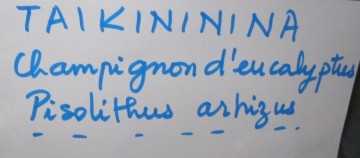
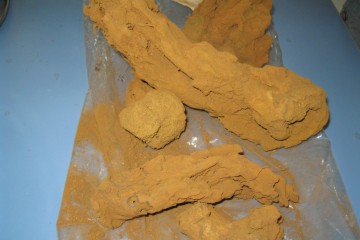
Tikininina
Pisolithus arhizus Photos © Nilia Bañares
There was only one man from Malaysia working with Pisolithus arhizus, a huge exemplar he says it grows by the roots of the Eucalyptus giving beautiful browns.
We are taking notes from many little big things for the Symposium in 2012. We keep your logo, as they did for Sweden and we add our logo from our card in Spain. We are working in the web-site, Anna is in charge in Barcelona and we hope we will have it ready soon.
We will keep in touch. Much love to you and all the best
Nilia Bañares
